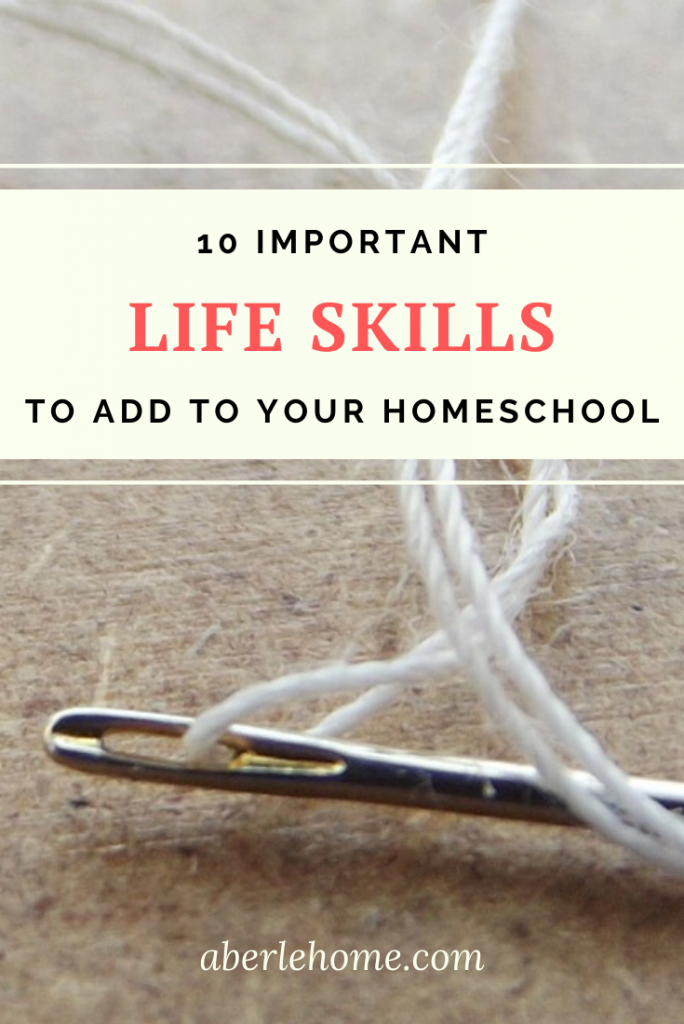
This post may contain affiliate links. See my full disclosure. As an Amazon Associate, I earn from qualifying purchases.
There will come a day when our kids will leave the nest to head off to college, to get married, or just to move out to live on their own.
As we are raising and educating our kids now, we can give them a head start by teaching them some foundational life skills they will need as adults!

This started as a list of ten life skills, but has grown since I’ve updated the post.
Most of these skills our children can learn (even from an early age) as they live and work together with us day by day as long as we include them and take the time to teach them. The rest of these skills can be incorporated into their homeschool lessons.
Are you teaching these life skills in your homeschool?
Life Skills to Add to Your Homeschool
1. Meal planning, Grocery shopping, Basic Cooking, & Nutrition
Young adults often struggle to prepare their own healthy meals when they leave the house to go to college. Freshman fifteen anyone?
And is there some truth to the stereotypical bachelor who doesn’t know how to cook?
With the added cost of pre-made and fast food meals, our kids will be better off if they know their way around the grocery store and the kitchen to prepare cost effective and healthy meals for themselves.
The easiest way to teach kids these skills is to, of course, make your children an integral part of the meal planning, grocery shopping, and cooking process for your family meals now, even when they are little.

2. Laundry & Cleaning
Children can begin to learn to clean properly, and to sort, stain-treat, wash, and fold laundry from a young age. They can help organize and keep the house tidy.
Including them takes a lot of effort when they are little, and it takes a lot of time and training for some kids to be neat and tidy on their own terms, but they will thank you later when they leave the house and already know how to do all of these things!
My toddlers are already acquiring these skills as we complete tasks together around the house each day.
They love to vacuum with the hose attachment, dust with the feather duster, fold washcloths, clean with a rag and their “cleaner” (a spray bottle with water) and empty their plastic dishes and utensils from the dishwasher and put them in the right drawer.
3. Repairs & Maintenance for the Home & Yard
To teach your kids these skills, you could involve them whenever a repair is made around the house, or when you are hanging artwork and decor or repainting.
They could help when you unclog the drains, clean the kitchen appliances, trim the shrubs, mow the lawn, plant a vegetable garden, or rake the leaves.
Look for projects that they can do or help with to become comfortable using basic tools.
4. Vehicle Maintenance
Boys and girls alike should know how to put on a spare tire, check the oil and fluid levels, and jump-start a battery in case they are in a situation where they don’t have help around.
5. Navigation
These days people rely heavily on the navigation on the car or phone, but our kids may face times when they are out of service or out of battery and won’t be able to rely on an electronic device to tell them where to go.
You could teach your children how to read a map of your city, and let them navigate to new places when they are riding in the vehicle with you. See if they can find their way home later!
Help them to pay attention to the roads and traffic laws.
6. Basic Sewing
Whether or not your children ever come to love sewing, they could learn to make simple repairs on their clothing for when the need arises (i.e. stitching up a hole, repairing a seam, shortening a hem, replacing a button, or adding a patch).
Your children could learn to sew on buttons by practicing sewing a few onto squares of scrap fabric or do some simple, fun sewing projects to acquire some very basic skills sewing by hand and with the sewing machine.
7. Practical School Subjects
Here are some practical subjects for your homeschool: consumer math, public speaking, and computer skills–skills most of us use on a daily basis no matter our occupation.
Consumer math would include counting change, taking measurements properly, working fractions in the kitchen when doubling recipes, personal finance, and more.
You can teach these skills without curricula, or you could look into a curriculum like BJU Press Consumer Math for your high school student. I enjoyed taking this course in high school.
Public-speaking is also essential, as the need to speak and share in front of others (whether in a small-group situation or in front of a crowd) will arise in your children’s lives. (Not to mention, speaking is a required subject in some states.)
Look for big and small ways, whenever possible, to give your children experience speaking and performing for an audience to practice communicating with confidence and clarity!
Have your children present school projects to the family, lead the family devotions occasionally, provide their opinions about a book you’re reading together or a current event, perform in recitals for their music or dance lessons, or perform in plays with their homeschool co-op, for a few ideas.
And for computer skills, you can start with typing.
You could try an online resource that will track your child’s progress, like typing.com, or you could simply place a copywork exercise in front of your child for them to type out correctly.
Consider using a computer skills curriculum for your student as well.
8. Understanding Current Events
Do your children understand what is going on in the world around them and how it affects them?
Can they engage in intelligent and productive discussions with others and form their own opinions from an informed position?
Consider allotting a small portion of each school day or your morning time to read about and discuss current events.
9. Safety
Don’t forget to teach your children their own address, their parents’ full names and phone numbers, what to do in an emergency situation, body safety, fire safety, basic first aid, computer safety, and any necessary safety relating to weather dangers in your area.
I’m sure you can think of even more ideas in this category!
10. Social Skills & Etiquette
Make sure to take the time to teach your kids important social skills and etiquette. Teach them how to meet and greet people, give a proper handshake, give people personal space, follow directions, resolve conflict, conduct themselves in different social situations in private and in public, communicate their needs, maintain good hygiene, and more!
11. Time Management & Productivity
Kids form lasting habits and skills for prioritizing their days and managing their time wisely as we parents establish and hold to healthy routines in the household and homeschool.

12. Caring for Children
There is a good chance our children will become parents themselves someday, so the know-how to care for and relate to babies and little children will be important.
If your child doesn’t get a chance to learn this from growing up with a younger sibling, perhaps your child could volunteer with the children’s ministry at your church, or maybe your family will have opportunities to babysit together.
Conclusion
So there you have a list of important skills to add to your homeschool as you raise your children into capable and confident adults!
Which of these skills do you want to begin to teach your children? Do you have any favorite resources in these categories?



Love this!!
Just about to begin our homeschooling journey with my almost 5 year old son and looking forward to teaching him all these life skills.
Thank you ❤️
I love to hear that! Thanks for reading, Holly! 🙂
Great blog!!! I have been homeschooling my children and blog like these have always been helpful.
Thanks for reading, Chris!
Great read!!! Thanks for sharing such a great blog, blog like these is really helpful.
Thanks for reading, Ashley!
Thank you for this important article. There are some things I wish I had done better on. A list like yours is very helpful. The internet is such a great resource for parents.
I always tried to teach my boys to be self reliant. They were mostly finished growing up before the internet was available. They Have grown up to be very responsible men.
Thank you for reading the article, Vickie! I bet you did an amazing job with your sons. Blessings! 🙂
We all learn the basic life skills from our home. And these skills helps to live a life better also to handle situations.
This post will really help people to understand the need of homeschooling.
So true. Thanks for reading!